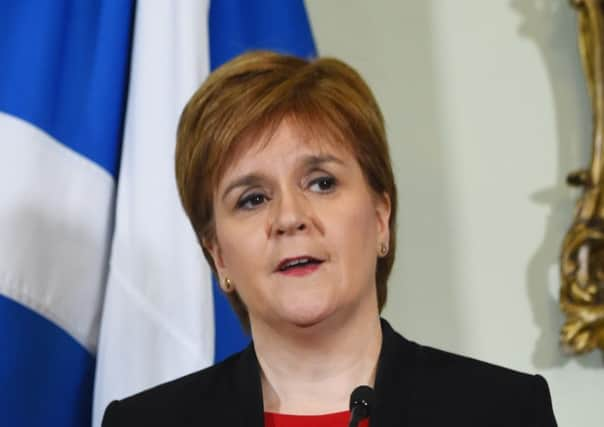Brexit: How meaningful vote could result in second independence referendum


The Prime Minister’s closest aides now appear so convinced that the deal won’t pass the House of Commons that they are already reportedly planning the speech that will be delivered if and when the deal is rejected by MPs.
All eyes will be on Downing Street, rather than Bute House – the official residence of Nicola Sturgeon – but it could yet be in Scotland that the major political drama takes place.
Advertisement
Hide AdAdvertisement
Hide AdMrs May is under pressure from all sides in the House of Commons, with some urging her to rule out a ‘No Deal’ Brexit, others backing the ‘clean break’ a no deal offers, and some even backing a second referendum on leaving the EU.
However, there could yet be another political crisis rearing its head, as Nicola Sturgeon prepares to unveil plans for a second independence referendum.
We look at how and when the First Minister could roll the dice on ‘indyref2’ after the blockbuster vote in the Commons next Tuesday.
The Big Call
SNP MPs in the House of Commons are set to join most Labour MPs, Liberal Democrats, and a significant portion of Conservatives in voting against Theresa May’s deal in parliament next week.
The expected defeat of that deal leaves Nicola Sturgeon with a big decision to make, and we have plenty of indications of what the First Minister plans to do.
There were no dates mentioned by Ms Sturgeon in her latest intervention, but she did say that she looked forward to unveiling her plans on a second referendum ‘very soon’.
While very soon doesn’t necessarily mean ‘immediately after the meaningful vote’, it is reasonable to expect that the rejection of the deal (and the chaos that would likely follow it) could be seen by many in the SNP as an opportunity to fire the starting gun on a re-run of the 2014 vote.
Launching the indyref2 campaign in the midst of parliament delivering a fatal blow to Theresa May’s Brexit deal might mean a battle for column inches and airtime, meaning a slight delay is to be expected.
Advertisement
Hide AdAdvertisement
Hide AdHowever, as the Brexit day approaches, most commentators would be surprised if there is not a significant move from Nicola Sturgeon ahead of the UK’s date of departure from the EU in March.
Justification
Other political parties, not to mention some in Scottish civic society, will be quick to condemn any announcement from the First Minister that suggests plans for another referendum are picking up.
Nicola Sturgeon will have the support of her SNP colleagues and much of the independence movement, but will find political opponents much harder to convince.
However, the statements of the First Minister earlier this week gave more than a hint about how she plans to justify any call for a second referendum on Scottish independence.
In contrast to Theresa May’s oft-mocked mantra that ‘nothing has changed’, the First Minister appears set to contend that everything has changed since Scotland voted against leaving the union in 2014.
Ms Sturgeon told the BBC: “Everything that has happened over the past couple of years, from Scotland facing exit from the EU against our will to every reasonable attempt at compromise to protect Scotland’s interests by the Scottish Government being spurned, to the powers of the Scottish Parliament being eroded, to the UK Government even taking the Scottish Government to court, all of that has strengthened and reinforced the case for Scotland to be independent.
Technicalities
As the current furore over Brexit proves, technical details, especially those regarding the constitution, can make or break political plans.
Currently, the Scottish Government has no power to hold a legally binding referendum on Scottish independence.
Advertisement
Hide AdAdvertisement
Hide AdThat power is reserved, and was temporarily transferred as part of the ‘Edinburgh Agreement’ ahead of the 2014 vote.
Ms Sturgeon previously requested that power, but her demands were rejected by Prime Minister Theresa May, who has indicated then any request for that power would result in a similar refusal.
That leaves the First Minister facing the nuclear option of attempting to hold a non-binding referendum, a move which would almost certainly end up in a court battle, and could see any vote boycotted.
But the demands will almost certainly be made nonetheless, and denying a second vote could put unionists in a difficult position, especially those who are pushing for a second Brexit vote.
Whatever happens, one thing is clear - the fight over Scotland’s constitution is not over by a long way, and could yet be settled by a re-run of the vote in 2014.